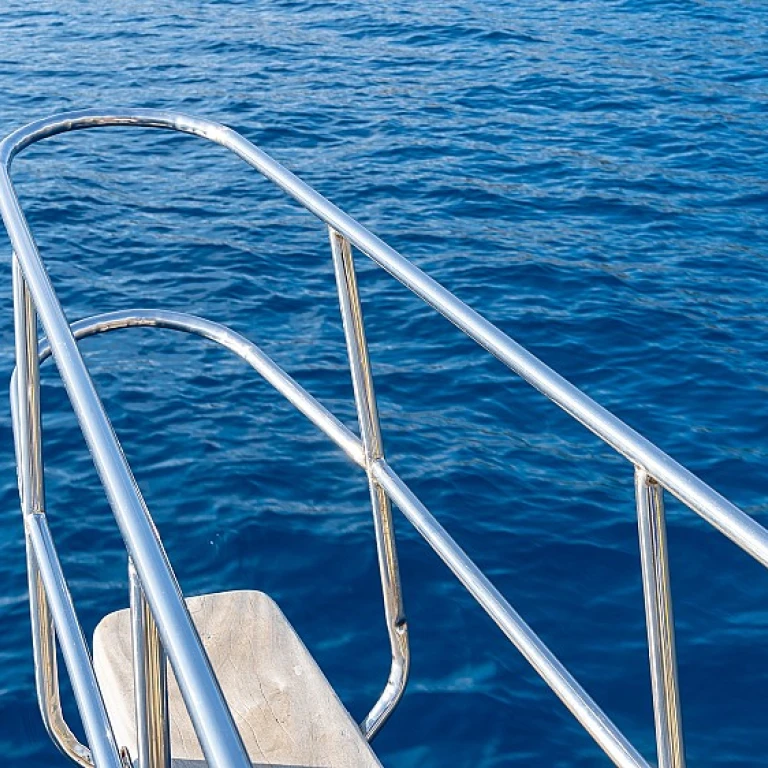-large-teaser.webp)
The Role of a Steward on a Yacht
The Heartbeat of Luxury Service
The steward on a yacht is an essential presence, playing a pivotal role in ensuring guests experience unrivaled luxury and comfort during their voyage. As a crucial member of the interior crew, the steward or stewardess is responsible for maintaining the yacht's impeccable standard of service. Their duties encompass various tasks, from managing guest requests and organizing activities to maintaining the cleanliness and aesthetic of the yacht's interior spaces.
Each day, a stewardess will find themselves engaging in a wide range of activities, from setting elegant dining tables and flower arrangements to assisting with laundry and cabin maintenance. The role requires meticulous attention to detail, whether it’s preparing the guest rooms to perfection or ensuring that the yacht's interior department runs smoothly.
Additionally, the steward's responsibilities extend beyond mere service. They play a significant part in enhancing the guest's overall experience during charters, often collaborating with other crew members to execute themed events and personalized celebrations. This dynamic role is integral not only to the satisfaction of those onboard but to the yacht's overall prestige as well.
The job can be demanding, with tasks varying each day depending on the guests’ needs and the yacht’s schedule. However, for yacht stewardesses, it’s an opportunity to travel the world, work in a luxurious environment, and be part of the competitive world of yachting. Aspiring crew members often start at entry-level positions, gaining experience that can lead to roles with increased responsibility and corresponding salary increments.
In understanding the significance of the steward's role, one can explore how experience and the right crew members contribute to a yacht’s seamless operation, reflecting directly on the quality of service provided to guests.
Factors Influencing Steward Salaries
Various Elements Affecting Steward Salaries
The salary of a stewardess on a yacht isn’t a fixed number and can fluctuate based on several critical factors. Understanding these aspects can help both current and aspiring yacht crew members better negotiate their worth or comprehend their salary structures.
- Type of Yacht: The size and type of yacht, whether it's a charter or privately owned, can significantly influence salaries. Larger superyachts often mean higher pay due to the complexity and volume of service required.
- Location and Season: The geographic location where the yacht operates plays a crucial role. Yachts cruising in high-demand areas or during peak charter seasons tend to offer higher salaries due to increased guest expectations.
- Level of Training and Certification: A yacht stewardess with specialized training and relevant certifications can command a higher salary. Skills such as silver service, bartending, and additional language proficiencies enhance the value of the stewardess.
- Quality of Service: Reputation matters. Experienced crew members known for providing high-quality service can secure better compensation.
- Career Longevity: The longer a stewardess remains in the field, the more experience they accumulate, paving the way for promotions and increased earnings.
- Negotiation Skills: Just like any other job, strong negotiation skills can lead to a more competitive salary. Having a clear understanding of their role and the market standards can significantly boost a stewardess's salary outlook.
As stewards evaluate these elements, it becomes apparent why two seemingly similar stewardess jobs can offer remarkably different paychecks. Exploring the nuances of the role can open doors to higher earnings and more rewarding career opportunities. For more insights into identifying potential roles, consider reading about how crucial it is to understand complementary positions like navigating the role of a chase boat captain, which also affects the holistic operation of a yacht.
Experience and Its Impact on Earnings
The Influence of Past Experience on Earnings
Experience is a significant factor in shaping the salary landscape for a steward on a yacht. For those considering a career in the yachting industry, understanding how experience influences earnings can offer insights into salary expectations over time. When starting as an entry-level stewardess or steward, the salary might be modest, especially when compared to the more established roles. However, each month spent working on board adds to a crew member's portfolio, paving the way for potential salary increases. More experienced yacht crew members bring a wealth of knowledge and service proficiency, making them invaluable to a yacht's smooth operation. For instance, individuals who have accrued several years of work experience in various yacht sizes, from smaller charter vessels to larger superyachts, often see a positive impact on their stewardship salaries. As they master the nuances of serving guests and managing the interior department, their market value increases. A seasoned interior crew member, particularly a chief stewardess, will command a higher salary month after month, reflecting the expertise and leadership they contribute. Moreover, stewards who have undergone training and are adept at handling additional responsibilities, such as managing other interior crew members or overseeing the yacht's interior decor, can further elevate their salary prospects. A dedicated approach to expanding one's role and taking on more complex duties not only enhances the stewardess job profile but can also position crew members advantageously during salary negotiations. In conclusion, building experience is a cornerstone for those aiming to boost their stewardess salary. Each role held, each yacht crew joined, and the knowledge gained through time are elements that help steer a stewardess towards higher earnings and more fulfilling opportunities in the yachting world. For a deep dive into how various roles and experiences further define your yacht career, consider exploring the versatility of different sized yachts and roles here.Comparing Salaries Across Different Yacht Sizes
Salary Differences Depending on Yacht Size
Understanding the impact of yacht size on the salary of a yacht stewardess is crucial for anyone looking to navigate their career in this unique industry. The size of the yacht not only influences the scale of service required but also directly affects salary structures and crew hierarchy.- Small Yachts (under 30m): In smaller yachts, roles are more flexible due to the limited number of crew members. While a stewardess might have a lower base salary in comparison to larger vessels, the room for gaining diverse experience is vast.
- Mid-Range Yachts (30m to 50m): As yachts increase in size, so do their requirements for service and specialized roles within the interior department. Salaries tend to be higher, with expectations for a more refined level of service. Yacht crew members, including stewardess jobs, may find more structured working conditions, yet still maintain a close-knit environment.
- Superyachts (over 50m): Superyachts demand a high level of professionalism and specialized training. The salary for a yacht steward or stewardess on a superyacht is substantially higher, reflecting the complexity and prestige of the service provided. These vessels often have a larger crew, including a chief stew or chief stewardess who oversees the interior crew and ensures the impeccable execution of responsibilities.
Additional Responsibilities and Their Effect on Pay
Extra Duties That Influence Financial Rewards
Taking on additional responsibilities can significantly affect the salary of a yacht stewardess. In the dynamic environment of yacht work, expanding one's role beyond basic service duties could pave the way for higher earnings. This willingness to assume a broader scope of tasks not only benefits the vessel's operation but can also translate into a more substantial paycheck. A chief stewardess often coordinates with the entire interior crew, ensuring seamless service and guest satisfaction. For those operating within smaller yachts, stewardesses may find themselves wearing multiple hats, engaging in roles beyond their original job description. This multitasking approach often comes with added compensation. As part of the yacht crew, undertaking specialized training or gaining certifications can bolster the stewardess's qualifications. This development enhances their ability to perform tasks related to guest entertainment, offering a gourmet dining experience, or managing the yacht's interior. The chief stew will often guide newer crew members to navigate through such enhancements. For superyacht crew, an entry level position may progressively lead to more complex responsibilities. The stewardess's salary might reflect these added obligations, particularly if they take charge during a charter. Steward identifications like proficiency in wine and spirits, expertise in managing sports equipment, or the ability to provide expert travel tips to guests contribute positively to the salary yacht stewardesses can command. Being proactive in these areas not only increases the steward's value but can also lead to negotiations for a higher monthly salary. Hence, understanding the landscape of duties and embracing extra responsibilities can serve as a cornerstone for increasing salaries in yacht service roles.Negotiating a Competitive Salary
Strategies for Securing a Better Salary
When it comes to negotiating a competitive salary as a steward or stewardess on a yacht, preparation and understanding of the industry standards are key. Your experience and the specific role you play on the yacht can significantly influence your earning potential. Here are some strategies to help you secure a better salary:
- Research Industry Standards: Understanding the average salary for yacht crew members, especially for your specific role, is crucial. This knowledge will provide a baseline for your negotiations.
- Highlight Your Experience: If you have extensive experience or specialized training, make sure to emphasize this during negotiations. Experienced yacht stewardesses or chief stews often command higher salaries due to their expertise and ability to manage the interior crew effectively.
- Showcase Additional Skills: If you have additional skills or have taken on extra responsibilities, such as managing the interior department or providing exceptional guest service, use these as leverage to negotiate a higher salary.
- Be Open to Different Yacht Sizes: Salaries can vary significantly depending on the size of the yacht. Be open to working on different sizes of yachts, as this flexibility might lead to better salary offers.
- Consider the Charter vs. Private Yacht Dynamic: Working on a charter yacht can sometimes offer more lucrative salary options due to tips from guests. Weigh the pros and cons of charter versus private yachts when considering your options.
- Negotiate Benefits: Besides the base salary, consider negotiating for additional benefits such as leave salary, bonuses, or other perks that enhance your overall compensation package.
Negotiating your salary is an essential part of your job as a yacht stewardess. With the right preparation and understanding of your worth, you can secure a salary that reflects your skills and contributions to the yacht crew.













